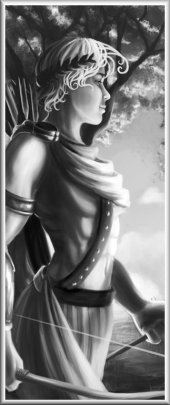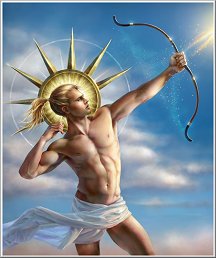
APOLLO By ALYANA

APOLLO
CLICK TO ENLARGE
|
APOLLO PAGE ONE
I will remember and not be unmindful of Apollo who shoots
afar. As he goes through the house of Zeus, the gods tremble
before him and all spring up from their seats when he draws
near, as he bends his bright bow.
But Leto alone stays by the side of Zeus who delights in
thunder; and then she unstrings his bow, and closes his quiver,
and takes his archery from his strong shoulders in her hands and
hangs them on a golden peg against a pillar of his father's
house.
Then she leads him to a seat and makes him sit: and the Father
gives him nectar in a golden cup welcoming his dear son, while
the other gods make him sit down there, and queenly Leto
rejoices because she bear a mighty son and an archer.
Rejoice, blessed Leto, for you bear glorious children, the lord
Apollo and Artemis who delights in arrows...
HOMERIC HYMN TO APOLLO
Apollo and his twin sister Artemis were the children of Zeus and
the Titaness Leto. He was born in the little island of Delos and
has been called "the most Greek of all the gods".
Apollo is one of the most important deities of both the Greek
and Roman religion, immortalized throughout the centuries by
countless poets, writers and artists. Prophecy, Archery, Light
and Music were his domains, and he was unsurpassed in those
areas.
He is a beautiful figure in Greek poetry, the master musician
who, along with his "choir", the Nine Muses, delights the gods
of Olympus with his golden lyre at their royal banquets.
He is the Archer-god, master of the silver bow, Apollo the
Far-Shooter, who can rain down death with his deadly arrows. But
he is also the god of Light - In all the Olympian gods, like in
mortal men, there is a continuous struggle between good and
evil, their light and dark sides, whatever the proportion of one
to the other might be; it must be noted that in Apollo there was
almost no darkness at all, his primitive and cruel side was
shown only briefly and in very few myths, such as the Flaying of
Marsyas.
He is also the god of Truth - legend has it that no false word
ever fell from his lips, and he foretold the future with the
same unerring accuracy as that of his arrows. Because of this
his oracle at Delphi was very important to people, serving as a
link between men and gods. It's interesting to note how Apollo's
famous seat at Delphi came to be:
When Apollo was only four days old (Greek gods sure grew up
fast!) he gained revenge by killing Python, the terrible
earth-serpent sent by Hera to torment his mother.
Python was an offspring of Gaea, Mother Earth, and issued
revelations through a fissure in the rock at Delphi, named after
the mate of Python, the monster Delphyne. The priestess called
Pythia would interpret these utterances, and give cryptic
answers to any questions asked.
Themis the Titaness fed him on nectar and ambrosia and on the
fourth day of his birth Apollo called for bows and arrows, which
were at once provided him by Hephaestus, the god of smiths and
the forge. He came upon the beast at Parnassus and managed to
wound it with his arrows, then followed it to Delphi, where he
killed Python in the shrine.
By slaying the monster he captured Delphi, even though he had to
do penance in the region of Thessaly for the killing. Twice Zeus
forced Apollo to be the slave of a mortal man to pay for his
crime (see more on Python next).
APOLLO CONTINUES ON PAGE
TWO
LOTS OF GREAT STORIES & COOL PIX
CLICK HERE!

|







